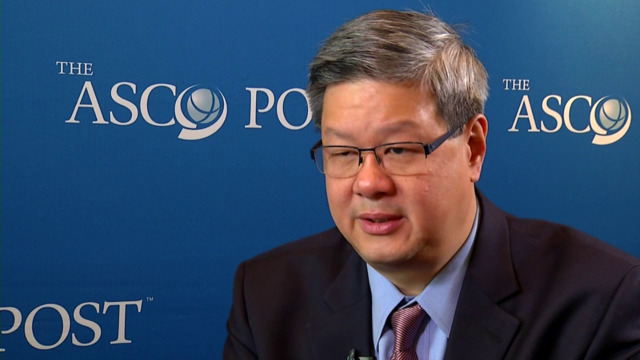In the Neoadjuvant Era, Intraperitoneal Chemotherapy Is of Benefit in Advanced Ovarian Cancer
The role of intraperitoneal (IP) chemotherapy in the treatment of advanced ovarian cancer has been debated for a long time. According to a new study presented at the 2016 ASCO Annual Meeting, a combination of IP and intravenous (IV) chemotherapy appears more effective than IV chemotherapy alone in...
Ronald David Alvarez, MD, Named Chair of Obstetrics and Gynecology at Vanderbilt University Medical Center
Ronald David Alvarez, MD, Ellen Gregg Shook Culverhouse Chair in the Division of Gynecologic Oncology and Vice Chair of the Department of Obstetrics and Gynecology at the University of Alabama at Birmingham (UAB), has been named Chair of the Department of Obstetrics and Gynecology at Vanderbilt...
Lisa A. Carey, MD, and Tuya Pal, MD, on BRCA Carriers: The Disparities in Management
Lisa A. Carey, MD, of the University of North Carolina, and Tuya Pal, MD, of H. Lee Moffitt Cancer Center & Research Institute, discuss the racial disparities in cancer risk management among BRCA carriers across a diverse sample of young black, Hispanic, and non-Hispanic white breast cancer survivors (Abstract LBA1504).
Jonathan A. Ledermann, MD, and Ursula A. Matulonis, MD, on Olaparib Maintenance Monotherapy for Ovarian Cancer
Jonathan A. Ledermann, MD, of Cancer Research UK and University College London Cancer Trials Centre, and Ursula A. Matulonis, MD, of the Dana-Farber Cancer Institute, discuss findings on overall survival in patients with platinum-sensitive relapsed serous ovarian cancer receiving olaparib maintenance monotherapy (Abstract 5501).
Helen MacKay, MD, and Ursula A. Matulonis, MD, on Epithelial Ovarian Cancer: Results From the OV21-PETROC Trial
Helen MacKay, MD, of the Sunnybrook Odette Cancer Centre, and Ursula A. Matulonis, MD, of Dana-Farber Cancer Institute, discuss findings from this phase II study of intraperitoneal vs intravenous chemotherapy following neoadjuvant chemotherapy and optimal debulking surgery in patients with epithelial ovarian cancer (Abstract LBA5503).
Eric Roeland, MD, and Linda Van Le, MD, on Gynecologic Cancers: Managing Menopausal Symptoms in Survivors
Eric Roeland, MD, of the University of California, San Diego, and Linda Van Le, MD, of the University of North Carolina discuss ways to manage symptoms that affect up to 80% of postmenopausal women, diminishing their quality of life.
Helen MacKay, MD, on Epithelial Ovarian Cancer: Results From the OV21/PETROC Trial
Helen MacKay, MD, of the Sunnybrook Odette Cancer Centre, discusses findings from this phase II study of intraperitoneal vs intravenous chemotherapy following neoadjuvant chemotherapy and optimal debulking surgery in patients with epithelial ovarian cancer (Abstract LBA5503).
The 10-Year Club
The following essay by Maurie Markman, MD, is adapted from The Big Casino: America’s Best Cancer Doctors Share Their Most Powerful Stories, which was coedited by Stan Winokur, MD, and Vincent Coppola and published in May 2014. The book is available on Amazon.com and thebigcasino.org. What’s...
NCCN Clinical Practice Guidelines in Oncology (NCCN Guidelines®): 2016 Guidelines
In 1996, the National Comprehensive Cancer Network (NCCN®) published its first set of Clinical Practice Guidelines in Oncology® (NCCN Guidelines®), covering eight tumor types. The NCCN Guidelines® are now published for more than 60 tumor types and topics. Some of the key updates for 2016 were...
Breaking Down Dogma With the Outgoing President of SGO
At the 2016 Society of Gynecologic Oncology (SGO) Annual Meeting on Women’s Cancer, The ASCO Post sat down with the SGO’s outgoing President, Robert L. Coleman, MD, and discussed the revolutionary potential of blood biomarkers, why enhanced recovery after surgery protocols is a significant...
Roundup of Ovarian Cancer Abstracts From 2016 SGO Annual Meeting on Women’s Cancer
At the 2016 Society of Gynecologic Oncology’s (SOG’s) Annual Meeting on Women’s Cancer, Thomas J. Herzog, MD, Clinical Director, University of Cincinnati (UC) Cancer Institute and Professor of Obstetrics and Gynecology at UC College of Medicine, provided commentary on several noteworthy ovarian...
Intraperitoneal Chemotherapy in Question in Ovarian Cancers
A phase III trial of bevacizumab (Avastin) with intravenous vs intraperitoneal chemotherapy showed no improvement in progression-free survival for first-line treatment of patients with optimally surgically resected stage II and III ovarian, peritoneal, or fallopian tube cancer.1 When compared with...
High-Accuracy Metabolomic Detection of Early-Stage Ovarian Cancer
As reported in Scientific Reports, Gaul and colleagues used high-performance mass spectrometry to interrogate the serum metabolome of patients with early-stage ovarian cancer and healthy controls. They were able to define a linear support vector machine model of 16 metabolites that identified...
Liquid Biopsies Predict Treatment Response and Survival in Gynecologic Cancers
A new study has demonstrated for the first time that personalized circulating tumor DNA (ctDNA) biomarkers in gynecologic cancers can detect the presence of residual tumor earlier than currently used serum and imaging studies.1,2 According to the data, undetectable levels of ctDNA at the completion ...
Study Supports Initial Attempt at Debulking Surgery in Stage IIIC Ovarian, Fallopian Tube, and Peritoneal Carcinoma
In a study exploring the effect of primary debulking surgery in women with bulky stage IIIC ovarian, fallopian tube, and primary peritoneal cancers, cytoreduction to no gross residual disease was associated with the best survival outcomes.1 Cytoreduction to 1 to 10 mm of residual disease was also...
Genetic Testing in Women With Ovarian Cancer Helps to Determine Prognosis
A new study suggests that homologous recombination deficiency may have significant prognostic implications for patients with ovarian cancer, highlighting the importance of genetic testing in this population.1 According to the data, patients with ovarian cancer who have mutations in genes affecting...
Expert Point of View: Kathleen Moore, MD
Session moderator Kathleen Moore, MD, Associate Professor of Obstetrics and Gynecology at the University of Oklahoma College of Medicine, Oklahoma City, said that while the response rates are “not incredibly high,” trabectedin offers another line of therapy where there previously was none. “I think ...
Trabectedin Improves Progression-Free Survival in Uterine Leiomyosarcoma
In women with uterine leiomyosarcoma, trabectedin (Yondelis), a novel cytotoxic agent, significantly improved progression-free survival, compared with dacarbazine (4.2 vs 1.5 months, hazard ratio [HR] = 0.55, P < .001). According to the study’s authors, a lack of cumulative toxicity allows...
Wui-Jin Koh, MD, on Vulvar Cancer: Guidelines Update
Wui-Jin Koh, MD, of the Fred Hutchinson Cancer Research Center, discusses the multiple services required to best treat this rare cancer.
Nadeem Abu-Rustum, MD, on Cervical Cancer: Evolving Treatment Strategies
Nadeem Abu-Rustum, MD, of Memorial Sloan Kettering Cancer Center, discusses improvements in fertility-sparing surgery for young women, advances in lymph node assessment, and the evolving role of chemotherapy and radiation.
100% of NCI-Designated Cancer Centers Endorse the Promotion of the HPV Vaccination for Cancer Prevention
All National Cancer Institute (NCI)-designated cancer centers have united to support human papillomavirus (HPV) vaccination (see below). A team of HPV experts drafted a consensus statement that advises widespread use of HPV vaccines to prevent cancer. HPV causes cancer of the cervix, anus, and...
Wui-Jin Koh, MD, on Making NCCN Guidelines Relevant Around the Globe
Wui-Jin Koh, MD, of the Fred Hutchinson Cancer Research Center and the Seattle Cancer Care Alliance, discusses the program to adapt NCCN guidelines to regions of the world with different resource availability. The first guideline to be adapted in this way is for cervical cancer, which is prevalent in the developing world.
Eduardo Cazap, MD, PhD, and James O. Armitage, MD, on The Current State of Cancer Research and Treatment: The Latin American Perspective
Eduardo Cazap, MD, PhD, of the Latin American & Caribbean Society of Medical Oncology, and James O. Armitage, MD, of the University of Nebraska Medical Center, discuss oncology from an international point of view.
Supriya Chopra, MD, on Reducing Late Bowel Toxicity in Cervical Cancer
Supriya Chopra, MD, of Tata Memorial Hospital, discusses results of the PARCER study, which compared conventional 3D conformal radiotherapy to image-guided intensity-modulated radiotherapy in reducing bowel side effects for women with cervical cancer (Abstract 8).
Could a Screening Test That Would Reduce Deaths From Ovarian Cancer Be on the Way?
"A solid triple but not a home run” is how Karen H. Lu, MD, characterized a study in The Lancet reporting a reduction in deaths from ovarian cancer with the use of multimodal ovarian cancer screening.1 Dr. Lu’s remark was one of several, mostly but not universally, favorable and optimistic comments ...
Hormone Replacement and Ovarian Cancer: Competing Risks in Decisions about Bilateral Salpingo-oophorectomy
Recently reported findings that bilateral salpingo-oophorectomy and hysterectomy decreased the risk of ovarian cancer compared to ovarian conservation and hysterectomy, without increasing cardiovascular, fracture, and other cancer risks, should “challenge” current thinking about bilateral...
Adding Gemcitabine to Chemoradiation Improves Survival Outcomes for Locally Advanced Cervical Cancer
A phase III, open-label, randomized trial found that adding gemcitabine to concurrent cisplatin chemoradiotherapy and using gemcitabine as adjuvant chemotherapy with cisplatin improved survival outcomes in women with locally advanced cervical cancer. Toxicity was increased compared to standard...
Trabectedin New Drug Application Withdrawn
Centocor Ortho Biotech Products, LP, announced that it has voluntarily withdrawn the New Drug Application (NDA) for trabectedin (Yondelis) for the treatment of women with recurrent ovarian cancer. The withdrawal is based on the FDA’s recommendation that an additional phase III study be conducted to ...
Important Briefs from the ACOG 59th Annual Clinical Meeting
Several presentations at the 59th Annual Clinical Meeting of the American College of Obstetricians and Gynecologists (ACOG), held April 30–May 4 in Washington, DC, focused on cancers associated with the reproductive tract and issues important to women’s health. Four noteworthy studies presented at...
2011 ASCO Annual Meeting: 3-Year Screening Interval Safe for Women with HPV-negative and Normal Pap Tests, Data Show
A large, “real-world” study has validated current recommendations from the American Congress of Obstetricians and Gynecologists (ACOG), American Cancer Society (ACS), and American Society for Colposcopy and Cervical Pathology (ASCCP) endorsing a 3-year cervical cancer screening interval for women...
Cancer Diagnosis Can Spark Worry over Numerous Health Concerns
The early discovery of my endometrial cancer is a prime example of the health rewards you can reap if you are lucky enough to have good medical care and a dogged physician. Long past menopause, I wasn’t experiencing any of the typical warning signs of the disease—vaginal bleeding or pelvic...
Novel Agents Prolong Disease-free Survival in Ovarian Cancer
Novel agents produced high response rates and prolonged remissions in patients with platinum-sensitive recurrent ovarian cancer, in studies reported at the 2011 ASCO Annual Meeting. In an international randomized phase II trial, maintenance therapy with the oral poly [ADP-ribose] polymerase (PARP)...
Cervical Cancer Screening Study Should Reassure Physicians and Patients that a 3-Year Screening Interval Is Safe and Effective
Results of a large-scale cervical cancer screening study using concurrent human papillomavirus (HPV) and Pap testing should “reassure” women over 30 who test negative for HPV and have normal Pap tests that “it is extremely safe to go 3 years” before being tested again, Barnett S. Kramer, MD, MPH,...
NCI Clinical Investigator Team Leadership Awards: Conversations in Gynecologic Oncology
The National Cancer Institute recognized Cheryl Saenz, MD, and Linda R. Duska, MD, among others, late last year with a Cancer Clinical Investigator Team Leadership Award. The 2-year award includes $50,000 in funding for cancer research programs at NCI-designated cancer centers. The ASCO Post...
Bevacizumab Makes Inroads against Ovarian Cancer
Bevacizumab (Avastin) administered with chemotherapy and continued after chemotherapy improves outcomes in ovarian cancer, according to two multicenter, randomized, double-blind phase III investigations presented at the 2011 ASCO Annual Meeting. The first study, ICON7, incorporated bevacizumab as...
Screening for Ovarian Cancer Does Not Reduce Mortality and Leads to Unnecessary Tests for False-Positives
Using a CA-125 blood test combined with transvaginal ultrasound for early detection of ovarian cancer failed to reduce the risk of mortality associated with the disease and led to a large number of false-positive tests with unnecessary related biopsies and other follow-up procedures in the large,...
Elderly Patients with Ovarian Cancer Least Likely to Receive Chemotherapy
An analysis of data for 4,617 women aged 65 years or older diagnosed with epithelial ovarian cancer found that those in the oldest age group, 80 and up, were least likely to receive any chemotherapy. While 53% of patients 80 and older received no chemotherapy, the rate was less than half (22%) for...
New Biomarker Test Cleared to Evaluate Ovarian Cancer Likelihood
Fujirebio Diagnostics announced that it has received 510(k) clearance from the FDA to market the company’s HE4 Test in an algorithm called ROMA to aid in assessing whether a premenopausal or postmenopausal woman who presents with an ovarian adnexal mass is at high or low likelihood of finding...
Screening for Ovarian Cancer May Do More Harm Than Good, but New Therapies for the Disease Are Improving Outcomes
At the Best of ASCO Miami meeting, Daniela Matei, MD, Indiana University Melvin and Bren Simon Cancer Center, Indianapolis, described how new approaches are significantly prolonging remission in ovarian cancer. Ovarian Screening Provides No Benefit The Prostate, Lung, Colorectal, and Ovarian (PLCO) ...
Alternative Treatment for Advanced Ovarian Cancer Reduces Neurotoxicity and Alopecia
A randomized phase III clinical trial found that carboplatin/pegylated liposomal doxorubicin (Doxil) was not superior in prolonging progression compared to the standard carboplatin/paclitaxel as first-line therapy of patients with advanced ovarian cancer. The carboplatin/liposomal doxorubicin...
Fighting to Get Back Control
I’ve had raging hormones since I was 18, when I was diagnosed with a benign pituitary adenoma. The tumor caused unpredictable menstrual cycles that remained constant throughout my life, even after it had been successfully treated. So 2 years ago, when I turned 40 and started having sudden bouts of...
FDA Approves Molecular Test to Detect HPV
Gen-Probe recently announced that the FDA has approved its APTIMA HPV assay, an amplified nucleic acid test that detects high-risk strains of human papillomavirus (HPV) that are associated with cervical cancer and precancerous lesions. The test has been approved to run on Gen-Probe’s fully...
Important Briefs from the 2011 European Multidisciplinary Cancer Congress
Nearly 16,000 people from 16 countries attended this year’s European Multidisciplinary Cancer Congress, held recently in Stockholm. The ASCO Post has featured several key reports from the meeting and will offer further coverage in upcoming issues. Additional noteworthy studies presented at the...
Advances in Gynecologic Cancer Surgery Continue to Improve Outcomes
Over the past several decades, advances in chemotherapy and surgery have begun to translate into improved survival in gynecologic malignancies. The ASCO Post recently spoke with Ginger Gardner, MD, a surgical oncologist at Memorial Sloan-Kettering Cancer Center, who specializes in the management...
New System for Cervical Cancer Screening Approved
Hologic announced that the FDA has approved its Cervista HTA (high throughput automation) system for use with its previously approved Cervista human papillomavirus (HPV) HR test. The Company’s Cervista HTA system automates the DNA extraction and detection steps of the Hologic Cervista HPV HR test,...
Nearly Identical Survival for Laparoscopy vs Laparatomy in Patients with Stage I/IIA Disease
Building on previously reported results that laparoscopic surgical management of uterine cancer is superior for short-term safety and length-of-stay endpoints, the Gynecologic Oncology Group reported small and lower than anticipated potential for increase risk of cancer recurrence with laparoscopy...
Similar Morbidity, Higher Costs for Robotic vs Laparoscopic Hysterectomy in Women with Endometrial Cancer
A population-based analysis comparing laparoscopic hysterectomy and robotic hysterectomy for endometrial cancer “found similar morbidity but increased cost compared with laparoscopic hysterectomy,” investigators reported in the Journal of Clinical Oncology.1 After adjusting for patient, surgeon,...
New Guidelines Recommend Less Frequent Screening for Cervical Cancer, but That Doesn’t Mean Screening Is Less Important
In the News focuses on media reports that your patients may have questions about at their next visit. This continuing column will provide summaries of articles in the popular press that may prompt such questions, as well as comments from colleagues in the field. In March 2012, the U.S. Preventive...
Scoring System Based on DNA Repair Pathways Predicts Outcomes and Response to Platinum Therapy
A potentially important tool to identify patients with advanced-stage ovarian cancer likely to benefit from platinum-based chemotherapy and redirect those with poor predicted outcomes to alternative treatments was developed using gene-expression data and validated in two independent datasets. While ...
Gab2 Promotes Characteristics of Epithelial-to-Mesenchymal Transition in Ovarian Cancer
Ovarian cancer is often diagnosed at a late stage, when cancer cells have already migrated and invaded other tissues and organs. Wang and colleagues from the University of Colorado Denver and the Dana-Farber Cancer Institute in Boston, showed that Gab2—a scaffolding adaptor protein that is...










